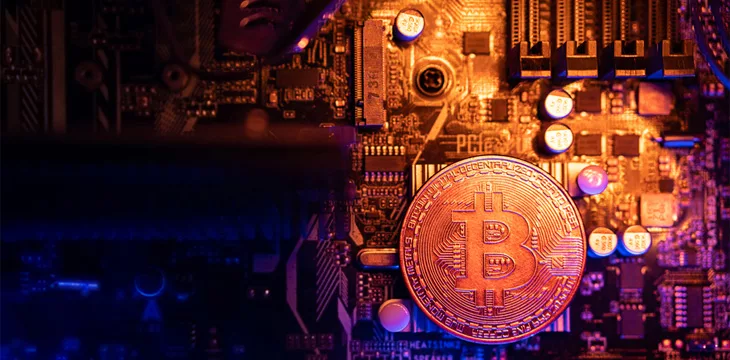|
Getting your Trinity Audio player ready...
|
In a recent Twitter Spaces session, CoinGeek’s Chief Bitcoin Historian, Kurt Wuckert Jr., talked to xolosArmy Radio to explain the big block mentality. It was an informative discussion on why big blocks matter and some of the hidden history of Bitcoin.
📢 Calling all #xolosArmy members! 🚨 Join us for an exciting #xolosArmyRadio 🎙️ Twitter Hangout on the topic of Bitcoin BigBlock Mentality! 🪙📈 We have a special guest, @kurtwuckertjr, renowned expert in the field. Don't miss out!
— xolosArmy Radio 🎙️ (@xolosArmyradio) May 20, 2023
https://t.co/1Ud4njMxhL
BCH is trying to create bigger blocks
The host explains that he’s into BCH and knows there’s a discussion about bigger blocks. He’s heard that BSV blockchain has 128MB blocks and asks Wuckert to tell him more.
Wuckert corrects the record, telling him that there have been 4GB blocks and that there have been over 75 million on-chain transactions on the day of the interview.
Looking back at history, Wuckert explains that BSV blockchain has changed the block size limit from a consensus setting to a policy setting. Node operators choose their own block size limit without impacting consensus at all.
Wuckert’s thoughts on decentralization
The host points out that he’s seen a few videos from Dr. Craig Wright and learned about the enterprise/government use cases for BSV blockchain. However, he is concerned that the network would become centralized as nodes grow bigger. He wants to hear Wuckert’s thoughts on this.
Wuckert replies that it depends on the meaning of decentralization. Whereas the BTC camp pursues decentralization as an end in itself, Wuckert believes it is a means to achieve security on distributed networks.
Furthermore, he points out that adding a third node to a network of two is a huge difference, but adding one more to a network of 1,000 barely changes anything. He doesn’t buy the ‘blockchain trilemma’ either; it’s sufficiently decentralized as long as a network won’t stop when one or two nodes are taken out.
Wuckert tells the host that it’s the nodes that mine blocks that matter—listening nodes don’t do anything of consequence to the network. He asks, “What is Bitcoin trying to disrupt?” saying that electronic cash is still the main use case.
Data on the blockchain
The host then asks a pointed question: Why is BSV so obsessed with storing everything on the blockchain?
Wuckert says this is a bit of a misunderstanding; overlay networks will play a role, and no serious BSVer advocates storing everyone on the network. Hashes of data will be written to the blockchain and linked to the raw data in the overlay networks.
That said, Wuckert says this will still involve terabyte-sized blocks to handle global payments, including Visa (NASDAQ: V), Mastercard (NASDAQ: MA), bank transfers, and cash.
Wuckert doesn’t believe that firms like Binance, Coinbase (NASDAQ: COIN), or Kraken can’t afford to run a BSV node today. He doesn’t believe these firms really care at all about Bitcoin; they just want to make money from trading fees.
The BSV blockchain wants to show people that on-chain trading is possible, and Ordinals demonstrates that in real-time. He doesn’t find it to be a coincidence that BSV entrepreneurs own that space and the best wallets for it right now.
“Trading on-chain is the value – it’s the incredible use case of this technology,” he says, noting that penny-sized trades are still only possible on the BSV blockchain.
What if BTC goes for bigger blocks?
The host wonders what will happen if BTCers raise the block size to something like 8MB. Can it absorb everybody?
Wuckert doesn’t think so—the culture will prohibit it. It’s a fundamentally toxic culture. Furthermore, he believes Blockstream and operators at the highest level in BTC are malicious and don’t want Bitcoin to succeed. They want to see it fail as a payment system because it would disrupt their businesses. It also buys them time to file patents and build their own systems.
Of course, BTC can raise its block size theoretically. However, billions of dollars have been invested in making people think this would be an attack, so it isn’t that easy. They have successfully convinced most people that big blockers are scammers, and walking that back would be very difficult. Furthermore, systems like Lightning Network would break and would require massive retooling should the block size be increased.
Should anyone attempt to do this, it would likely cause a chain split, and the BTC Core controllers would label the fork a scam coin as they did with BCH and BSV.
Is there a place for side chains, smart contracts, etc?
The host says that in BCH, there’s a lot of chat about the need for side chains, second layers, etc. He wants to know if Wuckert sees a place for these.
Wuckert handles smart contracts first; they’re not smart, and they still require humans to mediate, negotiate, etc. If we were perfect enough to create an ideal system, we wouldn’t need the perfect system.
As for side chains and second layers, Wuckert says they can have a place. Not absolutely everything needs to be on the main chain. He points out that things like the Lightning Network aren’t even layer twos; they are separate systems.
On a related question about creating cash tokens on the blockchain without government intervention, Wuckert says that while he’s a libertarian, he has concerns. First, the fact that everyone can change consensus is an issue. Second, from a technical standpoint, changes that make miner-validated tokens easy on BCH are subsidizing a certain type of behavior and may have unintended consequences.
Wuckert emphasizes that anyone arguing Bitcoin should be changed is short-sighted. Yes, endless things can be done in the script stack, but the fundamental protocol rules cannot and should not be changed.
Why limit the block size?
The host explains that BCH plans to increase the block size to a few hundred megabytes at most. He asks for Wuckert’s thoughts on this.
Wuckert says he finds this very uninteresting. You can’t replace Visa at anything like 200MB; on BSV, 70 or 80 million transactions require gigabyte blocks, and that’s not even enough to replace Visa. BCH needs to increase block sizes by order of magnitude if it has any such ambitions.
Noting the host said that BCH engineers are cautious, Wuckert says that they will take big risks, such as a hard fork, to allow miner-validated tokens. If they’re willing to take these risks, why not for block size increases?
Speaking of potential mistakes and breaking the network, Wuckert points out that this is why BSV blockchain has introduced human elements such as abiding by the law. That someone’s property could disappear because of someone’s incompetence or for other reasons, such as theft, is unacceptable to him, and this isn’t the sort of world we should want to live in.
For the rest of the discussion, Wuckert and the host discuss the proper role of government in Bitcoin, whether it is fundamentally a good or bad thing, and why the BSV blockchain is “government-friendly.” Check out this interesting discussion by listening to the Twitter spaces session directly!
Watch: Honest nodes—what is their role in Bitcoin?

 02-18-2026
02-18-2026 




